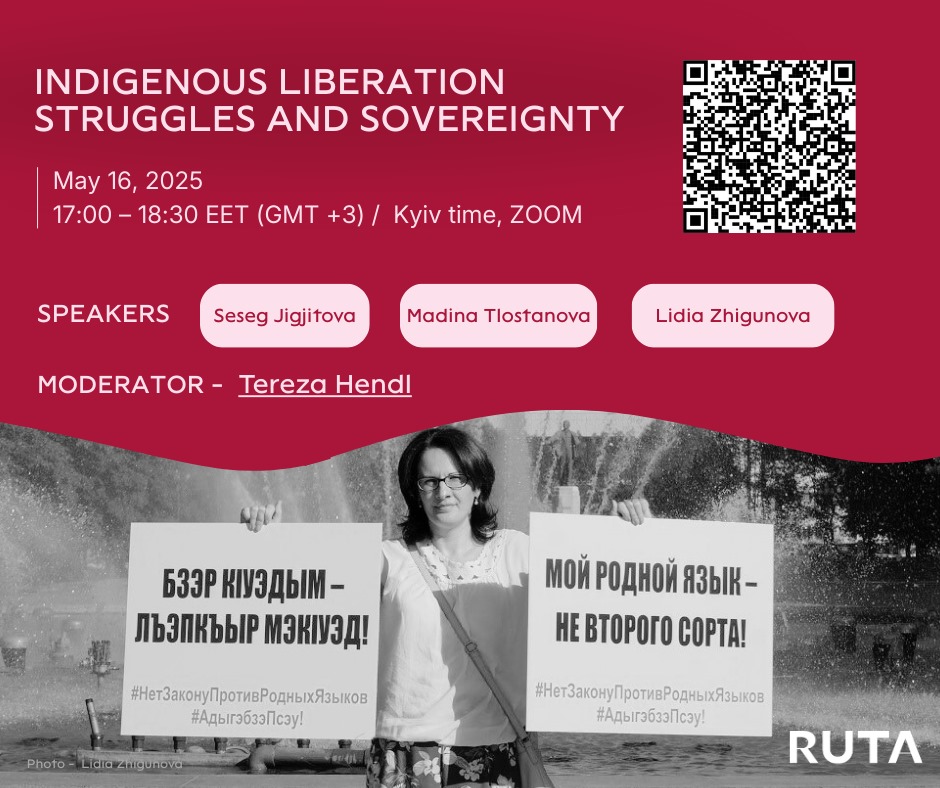Indigenous liberation struggles and sovereignty
In this image, you see Lidia Zhigunova at a single-person protest in Nalchik, Kabardino-Balkar Republic (KBR), July 17, 2018. The signs read: In Circassian (left): “The death of a language is the death of a nation.” In Russian (right): “My native language is not second-rate.” Both signs carry the hashtags: #NoToTheLawThatSilencesNativeLanguages and #CircassianLanguageMustLive.
The notion of Indigeneity and the concerns of Indigenous populations in the RUTA region(s) have not been widely understood. A common misunderstanding of Indigeneity is that it means being from or being native to somewhere, yet instead, the term relates to an abusive power relationship between the coloniser and the colonised and decolonizing. So far, the relevance and importance of Indigenous concerns within the RUTA region(s) have not been well known. At least not far beyond the Indigenous populations who have been directly affected by a long legacy of colonial oppression, particularly the ongoing systemic violence perpetrated by Russian-Soviet empires. Meanwhile, on a global scale, debates and conceptualisations of Indigeneity have largely focused on Western settler colonial states. How is Indigeneity discussed by Indigenous scholars and decolonial justice advocates from North Caucasus, Central and North Asia? What are the main concerns, demands and socio-political needs of Indigenous populations who have been harmed by centuries of Russian colonialism and genocides? And which injustices are done to Indigenous communities within the RUTA region(s) in the instances when Indigenous peoples are framed as ‘Russian’? On the path forward, which ongoing dialogues and solidarities within different parts of the RUTA region(s) can we build on to strengthen mutual support across our various anti-imperialist movements? And how can we find sensible ways to address difficult and complex issues, such as that Indigenous men have been disproportionately drafted to fight in the ongoing Russian invasion of Ukraine? This panel will provide the opportunity to hear from leading Indigenous scholars and activists and learn about the legacies of Indigenous resistance against Russian colonialism, including Indigenous organising against forced Russification and mobilization. Coming together, we will explore how to build stronger solidarity movements and alliances as well as more historically and materially informed and intersectional de/anticolonial thinking in our activist and academic work.
Speakers: Seseg Jigjitova, Madina Tlostanova, Lidia Zhigunova
Moderator: Tereza Hendl
Seseg Jigjitova is an architect, illustrator, activist from Buryatia, a founder and a board member of Nomads Indigenous Collective e.V. – the association working to build transnational solidarities across North Asian, Central Asian, Caucasian and global Indigenous communities. As an architect, she had the opportunity to work with ethnic minority communities in rural areas of Nepal, which sparked her deeper interest in decoloniality, Indigeneity, and identity. Later, the full-scale invasion of Ukraine became a personal turning point, prompting her to engage into anti-war activism and decolonial practices, connect her lived experience with her family’s history of Soviet repression, Russification, and resistance. She is currently developing an illustrated autobiographical book that weaves together personal narratives, family memories, and reflections on Buryat histories. She has published articles in the English edition of The Moscow Times, Global Voices, and Asians of Russia.
Madina Tlostanova is a feminist thinker and fiction writer, professor of postcolonial feminisms at Linköping University. Her research interests focus on decoloniality, feminist social movements and theories of the Global South; the postsocialist human condition, fiction, and art; critical future inquiries and critical interventions into complexity, crisis, and change. Tlostanova`s numerous works have been translated into many languages. Her most recent books include A new Political Imagination, Making the Case (co-authored with Tony Fry, Routledge, 2020), Decoloniality of Knowledge, Being and Sensing (Centre of Contemporary Culture Tselinny, Kazakhstan, 2020, Kazakhian translation – 2023), and Narratives of Unsettlement. Being Out-of-joint as a Generative Human Condition (Routledge, 2023). Currently she is working on a book on the stateless future.
Lidia Zhigunova is a Senior Professor of Practice in Comparative Literature at Tulane University, USA. A native of the North Caucasus, she specializes in Russian imperial and post-Soviet cultural histories, Indigenous studies, and postcolonial and feminist theory. Her research examines language, memory, and identity across the multiethnic spaces of the Russian Empire and its successor states, with a particular focus on the political, environmental, social, religious, and cultural histories of the Circassians—one of the Indigenous peoples of the North Caucasus. Her recent publications include “Surviving Suppression: Circassian Language Preservation in Russia and the Diaspora,” in Languages in Conflict and War: Ukraine, the Caucasus and the Baltics. Palgrave, 2025 (forthcoming); “Under the Holy Tree: Circassian Activism, Indigenous Cosmologies and Decolonizing Practices” (co-authored with Raymond Taras). In Language and Society in the Caucasus. Lund: Universus Academic Press, 2021; “Circassian Trajectories Between Post-Soviet Neocolonialism, Indigeneity and Diasporic Dispersions” (co-authored with Madina Tlostanova), in Postcolonial and Postsocialist Dialogues. Routledge, 2021.
Tereza Hendl is a political philosopher, specialised in concerns of global health justice. She investigates concerns of oppression, vulnerability, refusal, empowerment, justice, and solidarity, and the ethics and epistemology of health technologies and interventions. Much of her research interrogates the impact of racialisation and white (western) supremacy, and the intersections of structural racism and sexism. Some of her latest work explores persistent hierarchies of knowledge as well as European East-West inequalities and their effects on health and wellbeing, also accounting for the impact of the intertwined and ongoing legacies of Russian and German imperialism, extractivism and coloniality. She is the founder of the CEE Feminist Research Network and co-founder of the RUTA Association for Central, South-Eastern, and Eastern European, Baltic, Caucasus, Central and Northern Asian Studies in Global Conversation. These initiatives amplify and interconnect so far epistemically marginalised knowledges and contribute to epistemic reparations.
